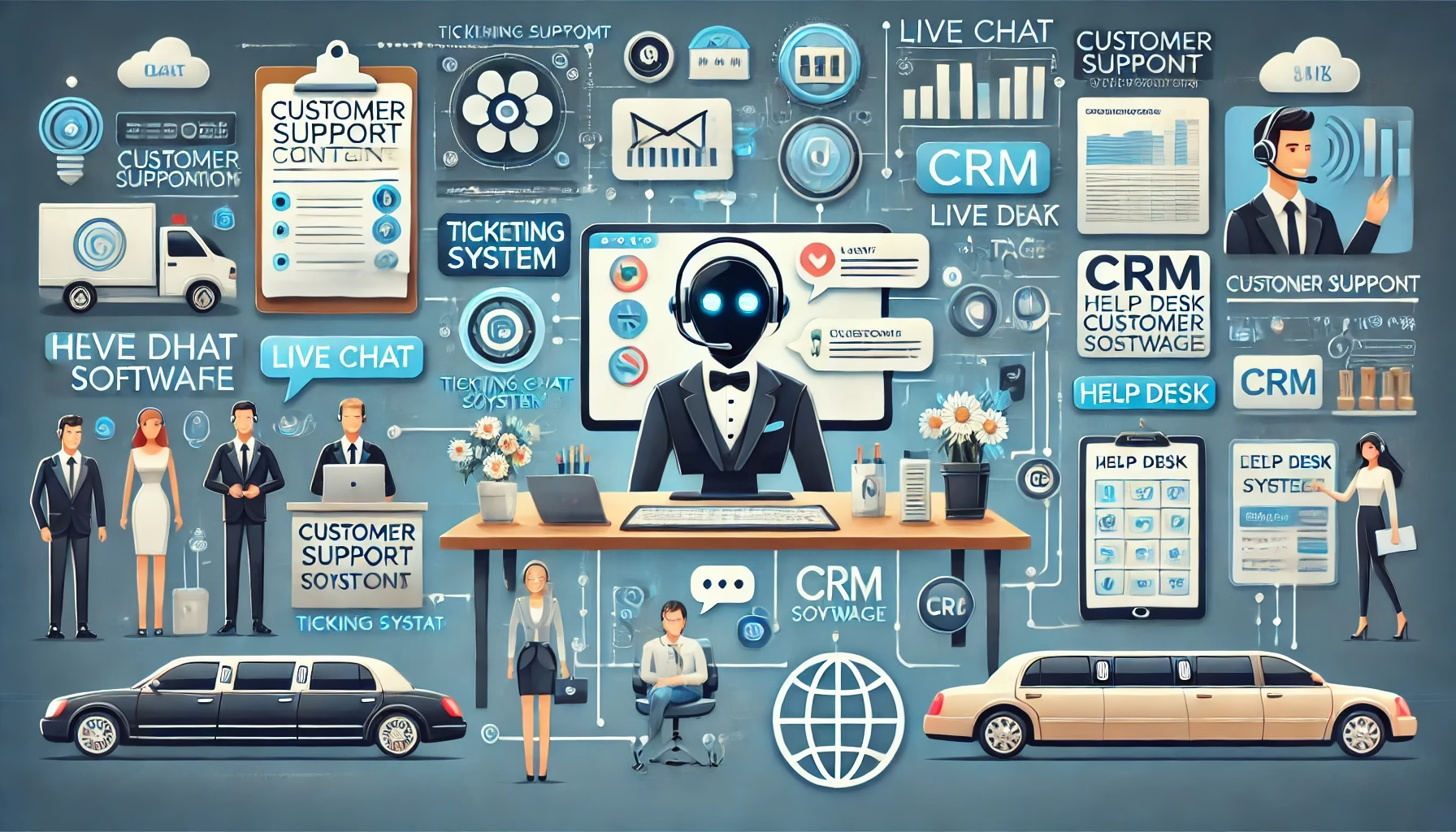The rise of ridesharing has transformed the transportation landscape, introducing new competitive dynamics for traditional dispatch services, including limousine services. In this era, the dispatching industry must navigate these shifting conditions by both competing and collaborating strategically. This article delves into the various aspects that impact dispatching in the rideshare era, including Dispatching in Rideshare Era, and discusses how balancing these factors can enhance both efficiency and service quality.
1. Evolving Customer Expectations and Instant Service Demands
With the success of ridesharing platforms, customers have grown accustomed to rapid, on-demand service. This shift in expectations poses a challenge for dispatch services that traditionally operate on pre-scheduled bookings and often manage specialized vehicles such as limousines.
The Issue:
Customers now expect instant access to dispatch services, with minimal waiting times. This demand for immediacy can be particularly challenging for limousine and chauffeur services, where vehicle availability and specialized offerings impact response times.
Solution:
To address this, dispatch companies can integrate advanced routing technology to provide real-time vehicle tracking and optimized dispatch routes. Implementing predictive analytics can also aid in anticipating peak service times, allowing companies to allocate resources effectively. Additionally, setting clear customer expectations about service delivery times can help manage demand while preserving quality standards.
Another approach is to adopt a hybrid model, combining on-demand options for certain services with pre-scheduled bookings for specialized requests. This model offers customers flexibility while allowing dispatch services to retain their core offerings. Dispatch platforms that implement these adjustments stand to gain a competitive edge in the Dispatching in Rideshare Era.
2. Integration of Advanced Dispatching Technology
The dispatching industry has witnessed substantial advancements in technology, from AI-driven platforms to GPS-enabled tracking. Ridesharing platforms excel in technology utilization, compelling traditional dispatch companies to upgrade or risk lagging behind.
The Issue:
For many dispatch services, especially smaller operators, investing in advanced technology can be financially burdensome. Outdated software or manual dispatch methods are not only inefficient but also incompatible with the standards set by ridesharing platforms.
Solution:
Implementing user-friendly dispatch software can streamline booking processes, monitor vehicle locations, and enable quicker response times. Options such as LimoAnywhere are designed for limousine services and offer scalability for operators of various sizes. Investing in compatible technology fosters both competitive parity and operational efficiency.
Additionally, incorporating a cloud-based platform can reduce operational costs while providing dispatch companies with the flexibility to manage services remotely. A hybrid model where traditional dispatch services can leverage app-based booking for on-demand scheduling is another effective way to merge traditional and ridesharing capabilities.
3. Developing a Collaborative Model with Rideshare Platforms
The competitive landscape does not necessarily preclude collaboration. By working with ridesharing companies, dispatch services can expand their service reach and tap into a broader customer base.
The Issue:
Traditional dispatch services may view rideshare platforms solely as competitors, but collaboration could unlock valuable new opportunities. However, integrating such a model can be logistically complex and may challenge long-standing practices within dispatch firms.
Solution:
One way to collaborate is through fleet-sharing agreements, where dispatch companies make use of rideshare vehicles during peak demand times. By partnering with rideshare platforms, traditional dispatch companies can supplement their fleets, increasing service capacity without significant investment.
Alternatively, dispatch services can form partnerships for specific services, such as offering premium, high-end vehicle options for special events, which many rideshare services cannot provide. By positioning limousine services as premium offerings within rideshare networks, dispatch firms can attract customers seeking luxury transportation.
4. Streamlining Operations Through Data-Driven Decisions
Ridesharing platforms excel at gathering and analyzing data to optimize their services. Adopting similar practices can benefit dispatch companies, particularly in predicting demand and managing operations.
The Issue:
For dispatch firms accustomed to traditional methods, transitioning to data-driven operations may seem overwhelming. The cost and complexity of data analytics tools can also be barriers for smaller companies.
Solution:
Implementing affordable data analytics tools can enable dispatch companies to monitor demand patterns, identify peak periods, and optimize driver schedules. Real-time analytics can inform strategic decisions, such as adjusting routes or increasing driver availability during high-demand hours.
Using insights from data can also enhance customer service by predicting needs and preferences. By analyzing previous bookings and customer feedback, dispatch services can refine their offerings, tailoring experiences that stand out in the Dispatching in Rideshare Era.
5. Creating a Competitive Pricing Strategy
Rideshare platforms often leverage dynamic pricing, adjusting fares based on demand. Developing a competitive yet sustainable pricing strategy is essential for dispatch services to retain customers and maintain profitability.
The Issue:
Setting prices that are both attractive to customers and viable for the company can be challenging, especially in an era where price competition is fierce. Misaligned pricing can lead to a loss of customers or unsustainable profit margins.
Solution:
Adopting a variable pricing model, where rates adjust based on demand and booking times, can provide a balance between customer affordability and profitability. For example, limousine services can offer discounted rates for off-peak hours while maintaining higher fares during popular time slots.
Providing bundled service packages, such as corporate rates or event-based offerings, can help attract loyal clients while keeping the pricing competitive. Customers may find value in bundled deals, particularly those seeking frequent or premium services.
6. Ensuring Customer Retention Through Exceptional Service
One of the biggest challenges in the Dispatching in Rideshare Era is retaining customers who have numerous transportation options. For limousine and dispatch services, providing a differentiated experience is crucial.
The Issue:
Customers accustomed to the convenience of ridesharing may be hesitant to commit to traditional dispatch services. The lack of a unique value proposition could result in a low customer retention rate.
Solution:
Offering exceptional customer support, from booking to arrival, can enhance the customer experience and differentiate traditional dispatch services. Personalized communication and attentive service create lasting impressions, encouraging repeat business.
Incentivizing loyalty through rewards programs or discounts for frequent customers can also improve retention rates. Limousine services that provide a tailored experience, with amenities such as refreshments and VIP customer service, can stand out as premium alternatives to standard rideshare options.
7. Enhancing Safety and Compliance Measures
Safety remains a top priority for dispatch services, particularly limousine operators who serve high-end clients. Ridesharing platforms often face scrutiny over safety standards, giving traditional services a potential competitive advantage.
The Issue:
Ensuring compliance with safety regulations requires continuous monitoring and can be resource-intensive. For companies managing larger fleets, maintaining consistent safety standards may be especially challenging.
Solution:
Regular safety audits, background checks for drivers, and vehicle inspections are crucial. Emphasizing safety can build trust and serve as a competitive differentiator, particularly for limousine services that prioritize client security.
Implementing safety-focused technology, such as in-vehicle monitoring systems, provides an added layer of security. Highlighting these safety features in marketing efforts can reassure clients and position the company as a trustworthy alternative to rideshare services.
8. Expanding Services to Diverse Markets
The Dispatching in Rideshare Era offers dispatch services the chance to diversify. Expanding beyond core offerings, such as into corporate or event-based transportation, can attract new customer segments.
The Issue:
For dispatch companies accustomed to specific markets, such as limousine services for personal travel, expanding into new sectors requires both financial investment and market knowledge.
Solution:
Conducting market research to understand potential clients’ needs is essential. By identifying demand in sectors like business travel or wedding services, dispatch companies can develop targeted packages that cater to those segments.
Creating partnerships with local businesses, event planners, or travel agencies can streamline entry into new markets. By positioning themselves as reliable, premium transportation options, dispatch services can tap into new revenue streams.
9. Training and Empowering Dispatch Staff
Dispatch staff play a critical role in ensuring smooth operations and customer satisfaction. Effective training and empowerment of the dispatch team are vital.
The Issue:
Without adequate training, dispatch staff may struggle to meet the demands of customers, especially when using new technologies. This can lead to inefficiencies and customer dissatisfaction.
Solution:
Providing comprehensive training on dispatch software and customer service skills empowers staff to handle diverse scenarios confidently. This includes mock scenarios and hands-on training with dispatch software to ensure proficiency.
Regularly updating training programs keeps dispatch staff informed of industry changes and service standards, further enhancing the client experience in the Dispatching in Rideshare Era.
10. Promoting Eco-Friendly Practices
Sustainability is a growing concern for customers. Dispatch services that adopt eco-friendly practices can appeal to environmentally conscious clients.
The Issue:
Eco-friendly initiatives can be costly and challenging to implement for smaller dispatch companies with limited budgets.
Solution:
Switching to fuel-efficient or hybrid vehicles is a practical first step, especially for larger fleets. This not only reduces environmental impact but also cuts fuel costs in the long run.
Promoting eco-conscious practices, such as digital receipts and route optimization to reduce fuel usage, reinforces a commitment to sustainability. Highlighting these efforts can attract clients who prioritize green transportation options.
Conclusion
Navigating the challenges of the Dispatching in Rideshare Era requires a balance between competition and collaboration. By adapting strategies to meet new demands and leveraging both traditional strengths and modern technology, dispatch services can thrive in today’s competitive landscape. For expert dispatch and customer support services, consider Saztech Solutions, where we bring over a decade of experience to elevate your dispatch operations.
Home | About Us | Pricing | Get Started | FAQ | Dispatch Daily | Contact Us
WhatsApp | Facebook | LinkedIn





Leave a Reply